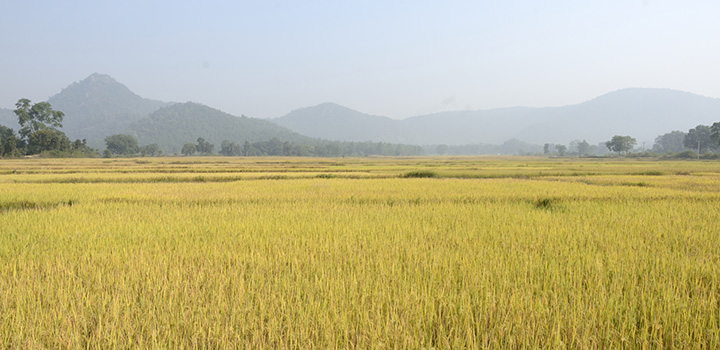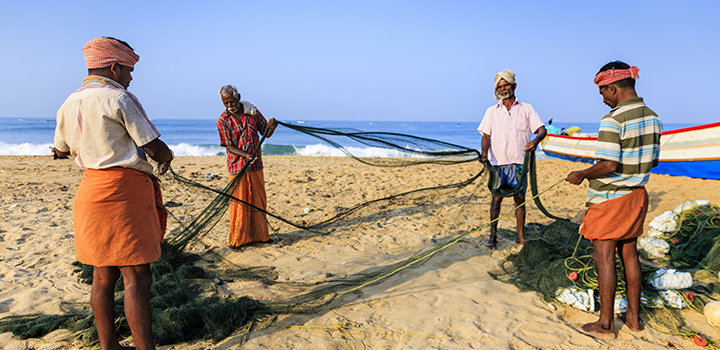Success of Indian food programmes depends on political enablement of state capacity
By: News Archive

New research explains why food security interventions have been met with varying levels of success across Indian states.
India’s Public Distribution System has a long history and clear national-level, legislative backing, but research led by the University of East Anglia (UEA) looks at why the food programme has been prioritised in some regions but not others. Comparing the relatively new states of Chhattisgarh and Jharkhand, both of which were granted statehood in 2000, the study found that the critical role played by the political leadership, shaped by an interrelated combination of electoral competition, societal pressures and mobilisationas well as bureaucratic capacity, accounts for the variations in implementation and outcomes.
The findings, ‘The political prioritisation of welfare in India: Comparing the Public Distribution System in Chhattisgarh and Jharkhand’, are published today in the journal World Development. The study was led by Dr Vasudha Chhotray, associate professor in UEA’s School of International Development, in partnership with researchers based at the Centre for Policy Research, New Delhi. The research was sponsored by the Effective States and Inclusive Development Research Centre at the University of Manchester.
India’s food security programme evolved from a public distribution system (PDS) targeted at urban areas in the 1950s and 1960s, to a more generalised provision including rural populations from the 1970s. By the early 2000s, reports of chronic hunger – despite food surpluses held in stock – resulted in concerted civic activism across the country.
The National Food Security Act (NFSA) of 2013 made India’s food security programme the largest in the world, providing highly subsidised foodgrain to roughly 70 per cent of the country’s population. But there remains considerable variation at state levels to deliver the programme.
The study team’s research from 2014-2017 focused on Chhattisgarh and Jharkhand, which have broadly similar demographic profiles, levels of poverty, and performance across a range of Human Development indicators – but have different nutrition outcomes. Both states expanded the PDS, though the expansion in coverage post-NFSA was greater in Chhattisgarh as compared to Jharkhand. Both states greatly reduced leakages but while Chhattisgarh undertook comprehensive reforms to make its PDS a nationally lauded model, Jharkhand’s reforms were patchier in comparison.
This research aimed to provide a systematic analysis of the political drivers of reform in the two newly created states. Why was Chhattisgarh able to politically prioritize the PDS but not Jharkhand?
The research finds that there are three sets of interrelated factorsthat orient the goals pursued by the political leadership with respect to the prioritisation of this crucial welfare intervention:
the nature of political-electoral competition
the nature of pressures exerted by influential societal groups
how the leadership enables the uses of bureaucratic capacity
A key historical puzzle that the research addresses is this: Jharkhand’s demand for statehood emerged from a strong mobilization of its tribal population, whereas Chhattisgarh lacks a comparable movement. So why has Jharkhand’s political elite not been able to drive the social policy agenda and serve the interests of its core constituency in the way that Chhattisgarh’s upper caste leadership has? One explanation the paper pursues is rooted in the social and electoral drivers of the developmental orientation of the political leadership. In Chhattisgarh, close competition between two national parties built considerable pressure on the ruling party to deliver on its poll agendas in response to the demands of powerful interest groups, like farmers, for example. In Jharkhand, despite considerable Adivasi political influence, repeatedly fractured political mandates and the lack of internal party cohesion were not similarly enabling.
The research shows that in Chhattisgarh, stable political rule was conducive to sustained bureaucratic reform; while in Jharkhand, this was never prioritized by short-lived governments. The greater responsiveness of Chhattisgarh’s bureaucracy to judicial intervention and civil society pressures that followed was predicated upon this. This also explains why, even though civil society mobilization in Jharkhand has a richer legacy, it has been less effective in leveraging the bureaucracy to introduce PDS reforms.
Finally, though the political leadership in both states engaged in high-level and high-stakes rent-seeking, the sheer fact of tenure stability of the elected elites in Chhattisgarh meant that they enjoyed a steady supply of rents, particularly in the extractive sector, allowing them to prioritize some areas of developmental reform. This was not the case in Jharkhand, where short-lived governments indiscriminately engaged in pervasive rent-seeking. PDS functionality was greatly improved in Chhattisgarh, tackling many areas of programmatic reform, though this has not been the case in Jharkhand to the same extent.
The research confirms that political leadership matters greatly for the political prioritisation of welfare, but provides further understanding of the conditions in which leaders will act to promote developmental objectives. Both the states in the study have experienced changes in leadership following recent electoral reversals, and it will be an exciting time to observe the relevance of the study’s findings even in the coming years.
“We hope that the analysis will be useful beyond the particular case of these states or even the PDS system in India. We seek to advance the understanding of the many guises of the welfare state,” write the authors.
‘The political prioritisation of welfare in India: Comparing the Public Distribution System in Chhattisgarh and Jharkhand’, is published in the journal World Development.
Related Articles

UEA academic set to sail from Africa to Australia for UNICEF
Prof Maren Duvendack, an intrepid academic from the School of Global Development at the University of East Anglia, is sailing more than 8,000 km from South Africa to Australia to raise money for UNICEF.
Read more
Family networks improve outcomes for internal migration
Small-scale fishers in India could be benefiting from increase in forced migration, thanks to new research from UEA.
Read more
New report from UEA Academic asks whether UK Aid Match has been used for ‘charity washing’, ahead of Westminster event
A new report from the University of East Anglias Dr Martin Scott into the Governments UK Aid Match (UKAM) scheme has led to concerns of charity washing, with suggestions some UKAM allocations may reflect Ministers pursuit of reputational benefits, rather
Read more